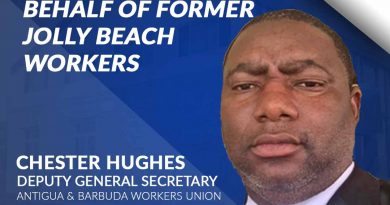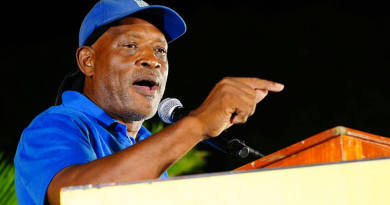ABWU hopes that post-election Administration will institute ‘fair and reasonable’ minimum wage of $10 per hour
The Antigua and Barbuda Workers’ Union (ABWU) is hoping that the January 18 General Election will bring a ruling administration that “respects workers” and rewards their efforts with a fair and equitable minimum-wage increase.
Since last year, 2022, the Union has been agitating on the issue of the National Minimum Wage and says it has researched and considered this issue in considerable detail as a member of the National Minimum Wage Advisory Committee.
According to the Union, it is “greatly disappointed and flabbergasted by the Cabinet’s rejection” of its recommended rate of increase. It is upset, as well, by Cabinet’s unilateral decision to set the new rate at $9 per hour, which represents an increase of only 80 cents on an already outdated minimum wage.
The Union considers the $10 per-hour minimum wage proposed by the United Progressive Party (UPP) to be a fair and reasonable rate, since it will allow those in the lowest income bracket to earn a livable wage.
It is also applauding the urgency with which the UPP proposes to implement the new minimum wage – by March 2023, if not sooner.
The Workers’ Union acknowledges that many Antiguans, Barbudans, CARICOM citizens and Dominican Republic nationals have been plunged into abject poverty because of the drastic hike in the cost of living and the stagnation of the National Minimum Wage.
This crisis, it says, requires swift action to bring relief to these thousands of workers who have kept the country’s economy from complete collapse.
The Union also notes the UPP’s pledge to adhere to the statutory requirement to review the National Minimum Wage every two years, which, it says, it takes “very seriously!”
“Between 2014 and 2022, Gaston Browne and the Antigua and Barbuda Labour Party (ABLP) Administration refused to honour this statutory requirement,” the Union notes.
It adds that the Minister of Labour, Steadroy “Cutie” Benjamin, also repeatedly ignored missives calling for the establishment of the National Minimum Wage Advisory Committee.
Therefore, the Union concludes, it is unfortunate that – on the verge of a General Election – discussions on a minimum wage have suddenly become a priority for the Administration, since, by its own track record, the Administration has no interest in the well-being of workers, especially the most vulnerable.
As of January 1 this year, the new minimum wage of $9 went into effect. Weekly-paid workers should already have seen a difference in their wages.




